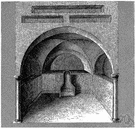catacomb
Also found in: Thesaurus, Encyclopedia, Wikipedia.
cat·a·comb
(kăt′ə-kōm′)n.
1. often catacombs An underground cemetery consisting of chambers or tunnels with recesses for graves.
2. An underground, often labyrinthine passageway.
[From French catacombes (plural), from Middle French Cathacombes, the name of a complex of Christian catacombs near the Appian Way on the outskirts of ancient Rome in which Saint Sebastian was said to be buried, ultimately from Late Latin Catacumbas, possibly from the name of the location before it was used as a burial site (perhaps originally the Greek name of a tavern on the Appian Way, *Kata Kumbās, literally "Under the Drinking Cups" : Greek kata, under; see cata- + Greek kumbē, shallow bowl, drinking cup, saucer; see cymbidium), or possibly from alteration (influenced by Latin -cumbere, to lie, as in recumbere, to lie down) of *Catatumbas : Greek kata + perhaps Late Latin tumbās, accusative plural of tumba, tomb; see tomb.]
American Heritage® Dictionary of the English Language, Fifth Edition. Copyright © 2016 by Houghton Mifflin Harcourt Publishing Company. Published by Houghton Mifflin Harcourt Publishing Company. All rights reserved.
catacomb
(ˈkætəˌkəʊm; -ˌkuːm)n
1. (Building) (usually plural) an underground burial place, esp the galleries at Rome, consisting of tunnels with vaults or niches leading off them for tombs
2. (Building) a series of interconnected underground tunnels or caves
3. (Physical Geography) a series of interconnected underground tunnels or caves
[Old English catacumbe, from Late Latin catacumbas (singular), name of the cemetery under the Basilica of St Sebastian, near Rome; origin unknown]
Collins English Dictionary – Complete and Unabridged, 12th Edition 2014 © HarperCollins Publishers 1991, 1994, 1998, 2000, 2003, 2006, 2007, 2009, 2011, 2014
cat•a•comb
(ˈkæt əˌkoʊm)n.
1. Usu., catacombs. an underground cemetery, esp. one consisting of tunnels and rooms with recesses dug out for coffins and tombs.
2. the Catacombs, the subterranean burial chambers of the early Christians in and near Rome, Italy.
3. an underground passageway, esp. one full of twists and turns.
[before 900; Middle English catacombe, Old English catacumbe < Late Latin catacumbās (acc. pl.)]
Random House Kernerman Webster's College Dictionary, © 2010 K Dictionaries Ltd. Copyright 2005, 1997, 1991 by Random House, Inc. All rights reserved.
catacomb
A subterranean burial ground, best known as used by the early Christians outside the walls of Rome.
Dictionary of Unfamiliar Words by Diagram Group Copyright © 2008 by Diagram Visual Information Limited
ThesaurusAntonymsRelated WordsSynonymsLegend:
Switch to new thesaurus
| Noun | 1. |  catacomb - an underground tunnel with recesses where bodies were buried (as in ancient Rome) catacomb - an underground tunnel with recesses where bodies were buried (as in ancient Rome)tunnel - a passageway through or under something, usually underground (especially one for trains or cars); "the tunnel reduced congestion at that intersection" capital of Italy, Eternal City, Italian capital, Rome, Roma - capital and largest city of Italy; on the Tiber; seat of the Roman Catholic Church; formerly the capital of the Roman Republic and the Roman Empire antiquity - the historic period preceding the Middle Ages in Europe |
Based on WordNet 3.0, Farlex clipart collection. © 2003-2012 Princeton University, Farlex Inc.
catacomb
nounThe American Heritage® Roget's Thesaurus. Copyright © 2013, 2014 by Houghton Mifflin Harcourt Publishing Company. Published by Houghton Mifflin Harcourt Publishing Company. All rights reserved.